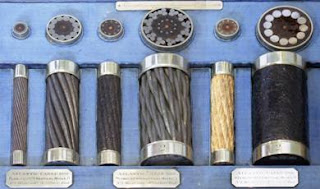So often we take our technology for granted. Family arguments can now be settled by someone pulling out their smartphone and accessing wikipedia. We can send email to a vendor overseas and receive a near instantaneous response. You can watch live video of shuttle or International Space Station astronauts streaming on the internet or on your television. Access to information is easy for those of us in the middle class western world.
And yet it's hard to fathom the ships of 1865 having the capability and the audacity to line the first transatlantic telegraph cable. That's some of the cable above, showing you the cross sections from this great site which has scanned images, maps, diary entries, news articles, and detailed descriptions of the whole venture.
I particularly love this piece of art showing the American eagle and the English lion with a cable and an ocean inbetween them, made to commemorate the clever businessman who's idea this all was. CBS news his carrying a brief article on this right now, but better to head to this site to get more details, first hand accounts and more accurate information. It's hard for me to believe they were able to accomplish this on the wooden sailing ships at the time. Harder still to know the initial attempt at running a line to Newfoundland failed when the cable snapped and they ended up going back later and miraculously retrieving it from the bottom of the ocean. It was clearly not an issue without its detractors given their was a saboteur on board the ship that laid the cable.
When completed it allowed telegraphs to be sent between at a lightning fast speed of 2 minutes per character, later 2 seconds per character with the 1866 cable. The cable predates Verne's 20,000 Leagues and yet opened the door to communication not possible before, messages that would have otherwise taken weeks. In today's world it's easy to see how technology has changed us. People question how its changing us, with some of the usual scare tactics claiming its weakening us; that with shorter attention spans and the constant attempt to multitask we're becoming a less capable society, generation by generation. That could be a whole three posts in and off itself. So I'll just stick with how impressive it is this feat was accomplished in the mid-19th century, how important it was to international relations, and how it continued to be a trend that follows us into our modern world today.

No comments:
Post a Comment